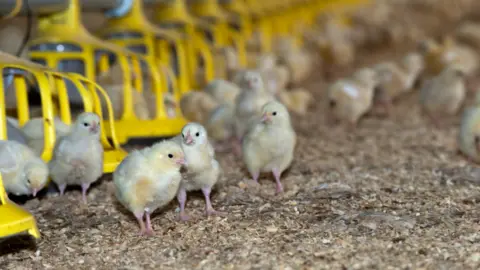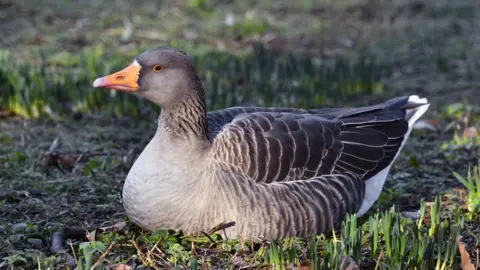Prevention zone after Herefordshire bird flu cases
 Getty Images
Getty ImagesAn outbreak of bird flu has been confirmed in Herefordshire, officials say, as a prevention zone is declared across England.
The Avian Influenza Prevention Zone (AIPZ) aims to mitigate the spread of the disease after other outbreaks of the "highly pathogenic" H5N8 strain in Gloucestershire, Dorset and Devon.
Bird keepers must now follow strict bio-security measures, Defra said.
A separate control zone has now been introduced in Herefordshire.
The latest case has been identified at a broiler breeder farm south of Leominster, Defra said.
'Low risk'
The 1.8m (3km) and 6.2m (10km) zone means restrictions are now in place around the movement of birds, how they are kept and visits made to the farm.
However, all of the birds on the site will be humanely culled to reduce the risk of the disease spreading.

Analysis
By David Gregory-Kumar, BBC science, environment and rural affairs correspondent
Poultry farmers feared this was coming, but still this is bad news for the industry.
The outbreak in Leominster is the third at a commercial poultry farm in the last 10 days. With avian flu also moving through farms in Europe and the discovery of the virus in wild birds in Gloucestershire, farmers and anyone with poultry is being asked to remain alert and make sure they obey strict bio-security rules.
If anyone sees dead wild birds like swans, geese, ducks, gulls or even birds of prey, they should report them to the Department for Environment, Food and Rural Affairs (Defra).
Those with free range turkeys in areas with outbreaks will be especially worried about this, because if they have to put their birds into lockdown and keep them inside that could lose them their free range label and potential sales.
What was looking like a pretty tough Christmas for poultry farmers could be about to get even tougher.
But, as the mass cull of millions of mink in Denmark over Covid-19 worries shows, you have to take the potential problems these viruses can cause very seriously.

 Getty Images
Getty ImagesUnder the new national prevention zone rules, keepers with more than 500 birds need to restrict access for non-essential people, workers will need to change clothing and footwear before entering enclosures and vehicles will need to be disinfected regularly, Defra said.
Earlier H5N8 cases have been confirmed in three wild geese found dead at the end of last month at the Wildfowl and Wetlands Trust (WWT) at Slimbridge, Gloucestershire, swans that died near Dawlish, Devon and a wild goose in Weymouth, Dorset.
Up to 13,500 birds have also been culled at a farm in Cheshire after cases were identified there with the strain related to a virus currently circulating in Europe.
The public is advised that the transmission risk is very low and avian flu also poses a very low risk to food safety, Defra added.

Follow BBC West Midlands on Facebook, Twitter and Instagram. Send your story ideas to: [email protected]
